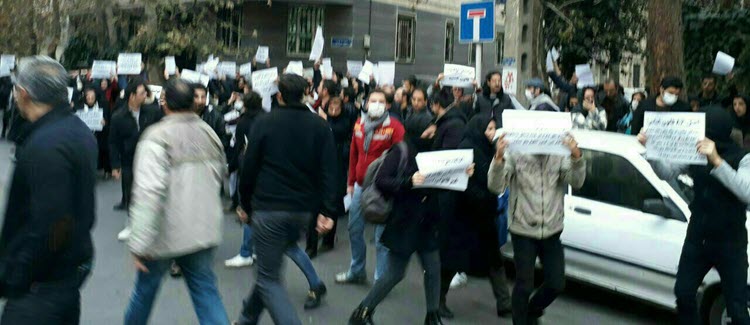
The National Council of Resistance of Iran (NCRI) reported that on 6th December, on the occasion of Student Day, students from various universities from all over Iran took to the streets to protest against the Iranian regime. Students chanted things such as “Students die, but do not accept humiliation” and “political prisoners must be freed”.
In Tabriz, students gathered in front of the university despite a huge presence of intelligence and plainclothes agents of the regime. They chanted: “Our last message to the incompetent regime: the freedom-loving nation is ready to rise up!”
In a ceremony on 5th December students from Zahedan University also expressed their anger at the regime and called for the release of political prisoners. Officials of the state prevented entry to the university so that protests could not happen.
Ma’soumeh Ebtekar, head of the Department of Environment of Rouhani, was giving a speech at Tarbiat Modarres University in Tehran when students repeatedly interrupted. They chanted: “Political prisoners must be freed.” They also protested against the catastrophic air pollution situation in various cities across the country.
Students at Khajeh Nasir University in Tehran put large banners on the walls of the amphitheatre reading “University is not a garrison, our university is alive” and “political prisoners must be freed”.
The NCRI also published an article about Iran’s economy that has plunged into recession despite the lifting of sanctions. The lifting of the sanctions was supposed to improve Iran’s economy, and thus the living conditions. The lack of security and stability and the domination of the Guardianship of the Islamic Jurist in Iran are some of the reasons why the economic situation has not stabilised.
Another main reason for the economic situation not improving is the power struggle. The NCRI said: “The large gap in power, the prospect of Khamenei’s death and the succession dispute, which has been accentuated two times by Khamenei, has created an unstable political situation for the regime. Simultaneously, the shadow of Presidential Election that is scheduled to be held in the spring of 2017, has drastically affected the economy of the country.”
They added that salaries of bank managers, insurance employees and government seniors are huge. This is an example of the “chronic corruption” in Iran, but it also shows the power struggle between the regime’s two factions.
“The detention of director of the largest bank of Iran ‘Mellat Bank’ by the Iranian Revolutionary Guards. The formal request by the Revolutionary Court to pass the life imprisonment sentence against the brother of regime’s President Hassan Rouhani and so on are the issues which have foreclosed an assuring atmosphere for any economic activities.”
The struggle is apparent in oil contracts too. The Minister of Petroleum sacked a large amount of managers when he was appointed. Some MPs approached the oil situation by calling for the reopening of the controversial Crescent oil contract.
In dispute with the government, the IRGC protested in front of the Ministry of Petroleum against new oil contracts between Iran and the West.
“It was clear that the oil contracts are the centre of dispute between the sides. After several months, Rouhani’s government finally surrendered and approved the Persian Oil Company (the subdivision of Khamenei’s foundations) and Khatam Brigade as the Iranian companies which partake with foreign companies in new oil contracts. In June 2016, Rouhani gave another concession to the IRGC for handing over 50 development projects to Khatam Brigade.”







